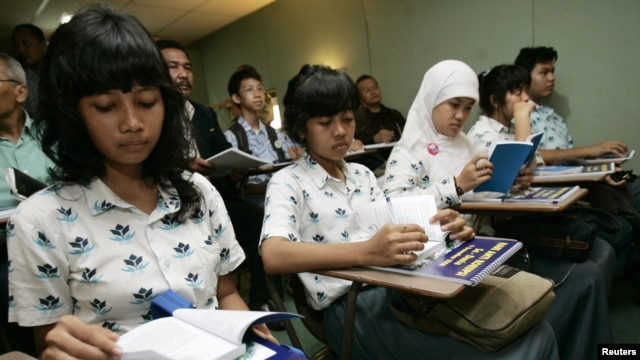Novel Martinus Sinaga

Terdapat 264 peristiwa pelanggaran kebebasan/berkeyakinan serta 371 tindakan pelanggaran dalam perspektif HAM.
JAKARTA, Jaringnews.com - Setara Institute dalam laporan mengenai kondisi kebebasan beragama dan berkeyakinan di Indonesia tahun 2012 mengemukakan, praktik intoleransi, diskriminatif dan kekerasan masih terus terjadi. Bahkan, tahun ini terjadi peningkatan..
Dalam laporan per 15 Desember 2012 tersebut, Setara mencatat, terdapat 264 peristiwa pelanggaran kebebasan/berkeyakinan serta 371 tindakan pelanggaran dalam perspektif HAM yang terjadi dalam kurun waktu setahun terakhir.
"Peningkatan jumlah peristiwa dan tindakan intoleransi, diskriminasi, dan kekerasan terlihat meningkat dalam kurun waktu enam tahun terakhir. Terdapat peningkatan dalam jumlah peristiwa dan tindakan yang terjadi," ujar Wakil Ketua Setara Institute, Tigor Naipospos, dalam konferensi pers yang digelar Setara di Hotel Atlet Century, Jakarta, Senin (17/12).
Adapun temuan tahun 2012 tersebut mengalami peningkatan cukup signifikan. Tahun 2011, terjadi 144 peristiwa dan 299 tindakan intoleransi. Tahun 2010, ada 216 peristiwa dan 286 tindakan. Kemudian berturut-turut 200 peristiwa dan 291 tindakan di 2009, 265 peristiwa dan 367 tindakan di 2008, serta 135 peristiwa dan 185 tindakan.
Sekedar catatan, laporan pemantauan ini membagi empat kategori tindakan pelanggaran, subjek hukum dan pertanggungjawaban. Pertama, tindakan aktif negara (by cimission). Kedua, Tindakan pembiaran yang dilakukan oleh negara (by ommision). Ketiga, tindakan kriminal warga negara. Keempat, tindakan intoleransi yang dilakukan oleh masyarakat.
Dalam laporan per 15 Desember 2012 tersebut, Setara mencatat, terdapat 264 peristiwa pelanggaran kebebasan/berkeyakinan serta 371 tindakan pelanggaran dalam perspektif HAM yang terjadi dalam kurun waktu setahun terakhir.
"Peningkatan jumlah peristiwa dan tindakan intoleransi, diskriminasi, dan kekerasan terlihat meningkat dalam kurun waktu enam tahun terakhir. Terdapat peningkatan dalam jumlah peristiwa dan tindakan yang terjadi," ujar Wakil Ketua Setara Institute, Tigor Naipospos, dalam konferensi pers yang digelar Setara di Hotel Atlet Century, Jakarta, Senin (17/12).
Adapun temuan tahun 2012 tersebut mengalami peningkatan cukup signifikan. Tahun 2011, terjadi 144 peristiwa dan 299 tindakan intoleransi. Tahun 2010, ada 216 peristiwa dan 286 tindakan. Kemudian berturut-turut 200 peristiwa dan 291 tindakan di 2009, 265 peristiwa dan 367 tindakan di 2008, serta 135 peristiwa dan 185 tindakan.
Sekedar catatan, laporan pemantauan ini membagi empat kategori tindakan pelanggaran, subjek hukum dan pertanggungjawaban. Pertama, tindakan aktif negara (by cimission). Kedua, Tindakan pembiaran yang dilakukan oleh negara (by ommision). Ketiga, tindakan kriminal warga negara. Keempat, tindakan intoleransi yang dilakukan oleh masyarakat.

